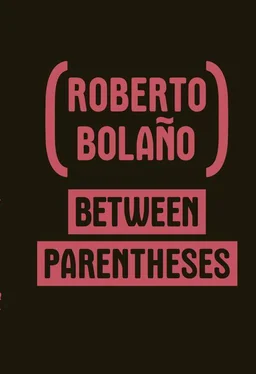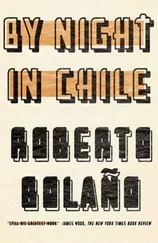Roberto Bolaño - Between Parentheses - Essays, Articles and Speeches, 1998-2003
Здесь есть возможность читать онлайн «Roberto Bolaño - Between Parentheses - Essays, Articles and Speeches, 1998-2003» весь текст электронной книги совершенно бесплатно (целиком полную версию без сокращений). В некоторых случаях можно слушать аудио, скачать через торрент в формате fb2 и присутствует краткое содержание. Год выпуска: 2011, Издательство: New Directions, Жанр: Публицистика, Критика, на английском языке. Описание произведения, (предисловие) а так же отзывы посетителей доступны на портале библиотеки ЛибКат.
- Название:Between Parentheses: Essays, Articles and Speeches, 1998-2003
- Автор:
- Издательство:New Directions
- Жанр:
- Год:2011
- ISBN:нет данных
- Рейтинг книги:4 / 5. Голосов: 1
-
Избранное:Добавить в избранное
- Отзывы:
-
Ваша оценка:
- 80
- 1
- 2
- 3
- 4
- 5
Between Parentheses: Essays, Articles and Speeches, 1998-2003: краткое содержание, описание и аннотация
Предлагаем к чтению аннотацию, описание, краткое содержание или предисловие (зависит от того, что написал сам автор книги «Between Parentheses: Essays, Articles and Speeches, 1998-2003»). Если вы не нашли необходимую информацию о книге — напишите в комментариях, мы постараемся отыскать её.
The Savage Detectives
Between Parenthese
Between Parentheses: Essays, Articles and Speeches, 1998-2003 — читать онлайн бесплатно полную книгу (весь текст) целиком
Ниже представлен текст книги, разбитый по страницам. Система сохранения места последней прочитанной страницы, позволяет с удобством читать онлайн бесплатно книгу «Between Parentheses: Essays, Articles and Speeches, 1998-2003», без необходимости каждый раз заново искать на чём Вы остановились. Поставьте закладку, и сможете в любой момент перейти на страницу, на которой закончили чтение.
Интервал:
Закладка:
At the end of the volume, the source for each piece is provided, along with a few explanatory notes. It can be seen here that only in exceptional cases, when a piece is of particular interest, has it been included without definite proof of publication. Our aim has been simply to gather Bolaño’s scattered writings, not to provide a place for unpublished pieces, or to pretend to make inroads into his posthumous body of work, which is immense.
At this point, it seems unnecessary to justify our choice of title — he chose it. All of the collected pieces were written by Roberto Bolaño during pauses in his incessant creative labors, or “between parentheses,” and that urgency inevitably shines through in this volume, most of its pieces written in the course of the writer’s increasingly desperate struggle with death to finish the monumental 2666 , which will surely confirm him as an utterly exceptional novelist, an essential figure.
We began by saying that this volume amounts to something like a personal cartography of Roberto Bolaño and comes closest, of everything he wrote, to being a kind of fragmented “autobiography.” That the pieces it contains are — as the author stressed — of a “basically literary” nature, doesn’t contradict this assertion. Borges boasted more about the books he’d read than the ones he’d written. In the “self-portrait” at the start of this volume, Bolaño, assiduous reader of Borges, claims to be “much happier reading than writing.”
“Criticism is the modern form of autobiography,” says Ricardo Piglia in Formas breves [Short Forms]. And he adds: “Writing fiction changes how we read, and a writer’s criticism is the secret mirror of his work.” Sergio Pitol says something similar in El arte de la fuga [The Art of Escape], a book that, like Piglia’s, bears a certain family resemblance to Between Parentheses . One might suggest other precedents for this kind of confessional writing through reading, understood as an autobiographical approach to the fiction writer, but what has been said will suffice to justify the guiding role that this book is called to play in the proper reception of Roberto Bolaño as an author whose influence in the realms of Spanish and Latin American literature has only just begun to be felt.
Ignacio Echevarría
Barcelona, May 2004
Between Parentheses: Essays, Articles and Speeches, 1998-2003
Of what is lost, irretrievably lost, all I wish to recover is the daily availability of my writing, lines capable of grasping me by the hair and lifting me up when I’m at the end of my strength.
Roberto Bolaño, AntwerpPreface: Self-Portrait
I was born in 1953, the year that Stalin and Dylan Thomas died. In 1973 I was detained for eight days by the military, which had staged a coup in my country, and in the gym where the political prisoners were held I found an English magazine with pictures of Dylan Thomas’s house in Wales. I had thought that Dylan Thomas died poor, but the house looked wonderful, almost like a fairytale cottage in the woods. There was no story about Stalin. But that night I dreamed of Stalin and Dylan Thomas: the two of them were at a bar in Mexico City, sitting at a little round table, a table for arm wrestling, but instead of wrestling they were competing to see who could hold his liquor better. The Welsh poet was drinking whiskey and the Soviet dictator was drinking vodka. As the dream went on, however, I was the only one who seemed to feel queasier and queasier, ever closer to the verge of nausea. Well there you have the story of my birth. As for my books, I should say that I’ve published five collections of poetry, one book of short stories, and seven novels. Almost no one has read my poems, which is probably a good thing. My books of prose have some loyal readers, probably undeservedly. In Consejos de un discípulo de Morrison a un fanático de Joyce [Advice from a Morrison Disciple to a Joyce Fanatic] (1984), written in collaboration with Antoni García Porta, I talk about violence. In The Skating Rink (1993), I talk about beauty, which is fleeting and usually meets a disastrous end. In Nazi Literature in the Americas (1996), I talk about the pathos and grandeur of the writing career. In Distant Star (1996), I attempt a very modest approximation of absolute evil. In The Savage Detectives (1998), I talk about adventure, which is always unexpected. In Amulet (1999), I try to give the reader the impassioned voice of a Uruguayan woman who should have been born in ancient Greece. I omit my third novel, Monsieur Pain , whose plot is indecipherable. Though I’ve lived in Europe for more than twenty years, my only nationality is Chilean, which in no way prevents me from feeling deeply Spanish and Latin American. In my life I’ve lived in three countries: Chile, Mexico, and Spain. I’ve worked at every job in the world, except the three or four that anybody with a little pride would turn down. My wife is Carolina López* and my son is Lautaro Bolaño. They’re both Catalan. In Catalonia, I learned the difficult art of tolerance. I’m much happier reading than writing.
*In March 2001, after this piece was written, Alexandra, the second child of Carolina and Roberto, was born.
I. Three Insufferable Speeches
The Vagaries of the Literature of Doom
It’s odd that it was bourgeois writers who transported José Hernández’s Martín Fierro to the center of the Argentine canon. The point is debatable, of course, but the truth is that Fierro, the gaucho, paradigm of the dispossessed, of the brave man (but also of the thug), presides over a canon, the Argentine canon, that only keeps getting stranger. As a poem, Martín Fierro is nothing out of this world. As a novel, however, it’s alive, full of meanings to explore, which means that the wind still gusts (or blasts) through it, it still smells of the out-of-doors, it still cheerfully accepts the blows of fate. Nevertheless, it’s a novel of freedom and squalor, not of good breeding and manners. It’s a novel about bravery rather than intelligence, let alone morality.
If Martín Fierro dominates Argentine literature and its place is in the center of the canon, the work of Borges, probably the greatest writer born in Latin America, is only a footnote.
It’s odd that Borges wrote so much and so well about Martín Fierro . Not just the young Borges, who can be nationalistic at times, if only on the page, but also the adult Borges, who is occasionally thrown into ecstasies (strange ecstasies, as if he were contemplating the gestures of the Sphinx) by the four most memorable scenes in Hernández’s work, and who sometimes even writes perfect, listless stories with plots imitative of Hernández’s. When Borges recalls Hernández, it’s not with the affection and admiration with which he refers to Güiraldes, or with the surprise and resignation evoked by Evaristo Carriego, that familiar bogeyman. With Hernández, or with Martín Fierro , Borges seems to be acting, acting to perfection, in fact, but in a play that strikes him from the beginning as not so much odious as wrongheaded. And yet, odious or wrongheaded, it also seems to him inevitable. In this sense, his silent death in Geneva is highly eloquent. More than eloquent. In fact, his death in Geneva talks a blue streak.
With Borges alive, Argentine literature becomes what most readers think of as Argentine literature. That is: there’s Macedonio Fernández, who at times resembles the Valéry of Buenos Aires; there’s Güiraldes, who’s rich and ailing; there’s Ezequiel Martínez Estrada; there’s Marechal, who later turns Peronist; there’s Mujica Láinez; there’s Bioy Casares, who writes Latin America’s first and best fantastic novel, though all the writers of Latin America rush to deny it; there’s Bianco; there’s Mallea, the pedant; there’s Silvina Ocampo; there’s Sábato; there’s Cortázar, best of them all; there’s Roberto Arlt, most hard done by. When Borges dies, everything suddenly comes to an end. It’s as if Merlin had died, though Buenos Aires’ literary circles aren’t exactly Camelot. Gone, most of all, is the reign of balance. Apollonian intelligence gives way to Dionysian desperation. Sleep, an often hypocritical, false, accommodating, cowardly sleep, becomes nightmare, a nightmare that’s often honest, loyal, brave, a nightmare that operates without a safety net, but a nightmare in the end, and, what’s worse, a literary nightmare, literary suicide, a literary dead end.
Читать дальшеИнтервал:
Закладка:
Похожие книги на «Between Parentheses: Essays, Articles and Speeches, 1998-2003»
Представляем Вашему вниманию похожие книги на «Between Parentheses: Essays, Articles and Speeches, 1998-2003» списком для выбора. Мы отобрали схожую по названию и смыслу литературу в надежде предоставить читателям больше вариантов отыскать новые, интересные, ещё непрочитанные произведения.
Обсуждение, отзывы о книге «Between Parentheses: Essays, Articles and Speeches, 1998-2003» и просто собственные мнения читателей. Оставьте ваши комментарии, напишите, что Вы думаете о произведении, его смысле или главных героях. Укажите что конкретно понравилось, а что нет, и почему Вы так считаете.












